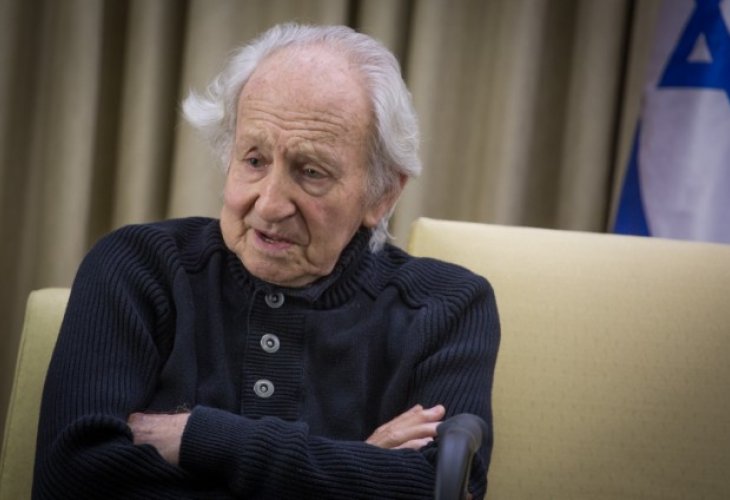The Holocaust
Holocaust Survivor Noah Klieger’s Final UN Speech: Why the World Must Teach the Shoah
Journalist and Auschwitz survivor Noah Klieger recalled the death marches, spoke of Hitler’s rise, and urged global Holocaust education for future generations
 Journalist and Holocaust survivor Noah Klieger (Photo: Flash 90)
Journalist and Holocaust survivor Noah Klieger (Photo: Flash 90)
On the occasion of the International Holocaust Remembrance Day ceremony at the UN, journalist Noah Klieger recounted his story as a Holocaust survivor and emphasized the importance of Holocaust education across the globe — especially now, as the generation of survivors is slowly disappearing.
It happened in January 1945, exactly 72 years earlier. “When the Soviet forces reached Auschwitz, I was no longer there,” began Klieger, a Yedioth Ahronoth journalist for 60 years, in his speech before the UN assembly. “The Germans, realizing they could not stop the Allied advance, evacuated Auschwitz — the complex of 45 camps, nine days earlier, transferring us to other camps where we were supposed to keep working to help Germany win the war.
“We were about 60,000 evacuated from Auschwitz, forced to march at a pace no one could endure. Those who fell behind were shot,” Klieger recalled. “The roads and paths from Auschwitz were lined with corpses of people shot by the SS because they couldn’t keep up. Others simply collapsed and died of exhaustion. The march lasted five days, to Gleiwitz — a small town on the border, where fewer than 19,000 of us arrived. The rest were left by the roadside.”
Klieger went on to describe how the Germans crammed 150 people into a single freight train car. “After some time, two-thirds of the prisoners in my car were dead, and we sat on a pile of corpses. When we finally reached the camp, some of us calculated that we hadn’t eaten for two weeks. How did anyone manage to survive? Very few of us did.”
On Hitler: “He didn’t seize power by force — he was elected”
At this point he paused, explaining why he chose to share his personal story from such a podium: “None of this is new. What’s new is that, for the first time, I was given the opportunity to speak here at the United Nations. And this will be the last time I am able to do so. I had the honor of being part of the new Israel, the new homeland for the Jewish people, from the very beginning. One thing is certain: my days on this earth are nearly over, but my country will live forever. And now, as we survivors near the end of our lives, it is time for the UN to take one step further: to adopt a resolution for the future. That future must be that the Holocaust is taught everywhere in the world. Because, my friends, today there are billions who do not know there was a Holocaust — and they must know. Holocaust education, and education about antisemitism, must be part of school curricula worldwide.”
According to Klieger, Auschwitz is a place beyond explanation. Just as “one cannot explain how the most advanced nation in the world at the time could blindly and enthusiastically follow what can only be called a caricature. Most Germans believed in him. And I tell this to the grandchildren of those Germans, because it is true. Their fathers and grandfathers voted for him. He did not take power by force — he was elected. And to this day, no one can truly explain it.”
“So what I can do is tell the stories. When I was in Auschwitz, the only thing we could do freely was dream. I had three dreams — but I knew I could never achieve them.
The first was to leave that hell on earth. I was convinced I would never leave alive, because no Jew brought to Auschwitz was meant to survive. You had to be extremely lucky, and I was very lucky.
The second dream was: if you survive, you must tell what happened in the camps. You must go on a mission to tell the world what occurred.
And finally, my third dream was to help the Jewish people become a united nation again, with a united country, like we had before the Romans sent us into 2,000 years of exile.
So today, I can proudly say, that I achieved all of my goals.”

